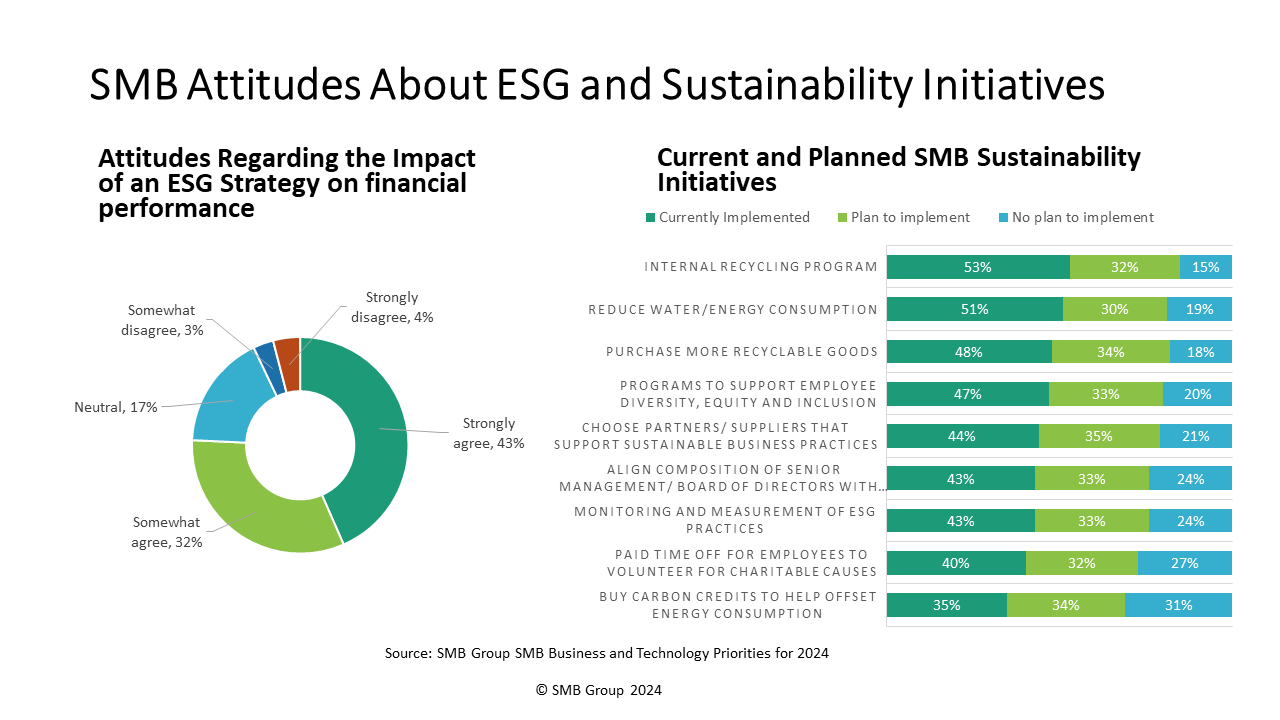Environmental, social, and governance (ESG) strategies and programs are now common practice for most large, publicly traded corporations. While small and medium businesses (SMBs) tend to lag behind their large enterprise counterparts, SMB Group research indicates that 75% of decision-makers agree that a strong sustainability strategy can help them improve business results—up from 57% a year ago.

Many SMBs have already implemented multiple sustainability initiatives, and most of them focus on the environmental aspects of sustainability. Roughly half already have programs for recycling, reducing water/energy consumption, and purchasing recyclable goods. SMBs report that these initiatives, as well as choosing suppliers that support sustainable business practices, are their top sustainability priorities for 2024.
The Circular Economy
Whether they use the term or not, these SMBs recognize that adopting policies and practices that align with the goals of a circular economy can provide significant value to the business.
The traditional, linear economy focuses on taking resources, making products, and disposing of them without much thought about where they will go when we dispose of them, or whether materials can be recovered and reused.
In contrast, the circular economy comprehensively views how materials are sourced and used to build products. In this model, products are designed and produced to minimize waste; they are remade, repaired, resold, or recycled.
A circular economy enables economic growth with less waste, by recycling products, components, untapped resources, and materials back into relevant value chains. It reduces toxic waste in dumps and landfills and helps address the problem of the increasingly scarce supply and the growing cost of raw materials.
In addition to environmental benefits and cost savings, sustainability practices can help to attract and retain customers and employees who prioritize these values.
Dell Technologies’ Longstanding Commitment to the Circular Economy
Before it became fashionable for most other companies, Dell Technologies began offering recycling to customers in 1996. Since then, Dell has set—and achieved—ambitious goals as it drives towards helping to reduce the estimated 54 million metric tons of e-waste generated globally each year. In the past couple of years, Dell’s work on sustainability-related innovations has produced more than 430 patent applications, each a testament to its dedication to infusing sustainability across their portfolio.
The company’s ESG goals continue to raise the bar. These goals are far-reaching, specific, and measurable, and include the following for 2030:
- For every metric ton of product a customer buys, Dell will reuse or recycle one metric ton.
- 100% of packaging will be made from recycled or renewable material or will use reused packaging.
- More than half of product content will be made from recycled, renewable, or reduced carbon emissions material.
Dell’s Concept Luna Inspires Sustainability
Two years ago, Dell introduced Concept Luna. Concept Luna is more than a vision—it’s a roadmap for a future where nothing goes to waste. This initiative is inspiring circular design across Dell’s portfolio, including laptops, monitors, servers, and storage.
Last year, for instance, Dell began manufacturing the Latitude 5000 series, Dell’s highest volume PC with:
- Almost three-quarters (71%) of the laptop lid is made from recyclable and renewable materials.
- Reclaimed carbon fiber (20%) and bio-based rubber feet made from castor bean oil (39%) are used in the system base to reduce reliance on petroleum-based materials.
- More than one-quarter (28%) of the fan housing is made with recycled ocean-bound plastics.
Modular design is a key focus of Luna. Learnings from Luna drive the creation of consumer and commercial products that are easy to repair and upgradeable, and therefore longer-lived. For instance, Dell has been designing its products with fewer screws and more snap-in pieces to make it easier for recyclers to dismantle them. Dell has also created about 100 million pounds of closed-loop plastic parts, which it uses on more than 125 different product lines. Typically, more than 90% of a Dell product can be recycled.
In 2024, expect Dell to deliver more serviceable display panels and further reduce adhesives and screws. Emission reduction is also a key focus, using recycled steel and low carbon emissions aluminum, and introducing recycled cobalt for laptop batteries to reduce dependence on mining.
Dell is also using advanced digital tools like AI and predictive analytics to extend component life. For instance, the introduction of QR codes on product bottoms paves the way for a more personalized support experience and facilitates a new era of advanced telemetry.
In addition, Dell provides free electronics recycling programs for consumers in 78 countries and provides commercial asset recovery to businesses in 44 countries.
Perspective
Dell continues its trailblazing role in transitioning the technology industry—and technology buyers—to the circular economy. Concept Luna and related initiatives drive home the message that you don’t need to sacrifice innovation for sustainability, or vice versa. Instead, these two goals can complement and strengthen each other.
As noted, the benefits of the circular economy are compelling for many SMBs. Dell’s continuing focus on sustainable technology provides these SMBs with additional opportunities to more easily meet their goals in this area. In addition, SMBs can also take inspiration from Dell’s vision and initiatives in their own endeavors to create more sustainable businesses.
© SMB Group 2024
